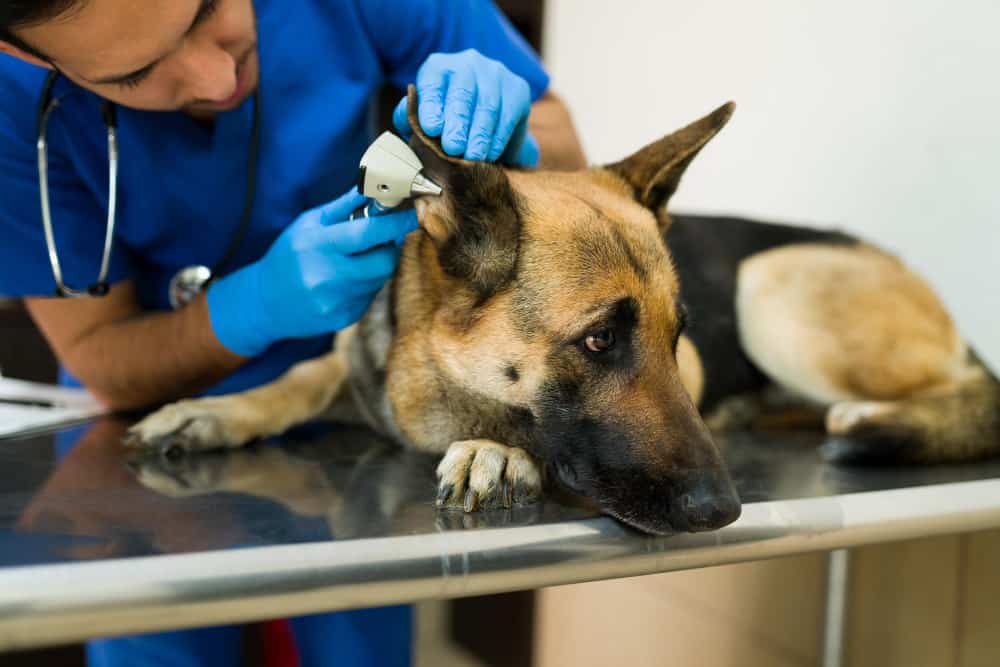Disclosure: This post contains affiliate links. We may earn a small commission if you decided to make a purchase, at no additional cost to you.
As a German Shepherd owner, you know that your furry companion is more than just a pet, they’re a member of your family. And just like any other family member, you want to make sure they’re healthy and happy. However, as much as we love our GSDs, vet bills can add up quickly and it can be hard to keep up with the costs.
Saving on your dog’s veterinary expenses really rests on prevention and preparation. Maximizing your dog’s health status, while preparing for something unforeseen is the best way to avoid being blindsided.
We understand how stressful it can be to see your beloved pet in need of medical attention, but also worrying about how you’re going to pay for it. That’s why we’ve put together this guide with 12 ways to save money on your vet bills, specifically tailored for GSD owners. With these tips, you’ll be able to give your GSD the care they need without breaking the bank.
12 ways to save money on your vet bills
A typical vet visit costs anywhere from $45 to $85. But anything more complicated, like dental cleaning, can go up to $400. To help those of us feeling the strain, we consulted medical professionals on how to keep these costs down.
Taking steps to improve the health and immunity of a German Shepherd greatly reduces your GSD’S vet bills. These steps include feeding your dog a healthy diet, regular exercise, treating allergies and parasites, proper grooming like dental care, and regular medical checkups. You can also get pet insurance to get you covered in case of an emergency.
Here are the tips for GSD owners like you:
1. Only buy puppies from reputable breeders
GSD puppies’ prices usually range from $1500 to $3000, and there are good reasons for that.
Sadly, there are about 50 known hereditary diseases in German Shepherds (Source: Journal of Veterinary behavior). A good breeder will always test their breeding dogs for problems like elbow and hip dysplasia, degenerative myelopathy (DM), and or eye problems, to mention a few.
However, some suspicious breeders may ask for as little as $500, which means they probably didn’t bother to test the parents for potential health issues they could pass to their puppies.
You may also like: $500 German Shepherd Puppy For Sale: Does it Make Sense?
The problem is that supporting a backyard breeder increases the risk of high vet bills in the long run. So buying a GSD from an ethical breeder ensures a healthy puppy whose parents have passed genetic tests, saving you many vet bills in the future.
2. Feed your dog the best diet
You are what you eat. The same goes for dogs.
Diet is one of the biggest contributors to the health of a canine. In general, a less-processed diet with real meat, and high-protein diet is best. But remember, there is no such as a one-size-fits-all diet for German Shepherds or other dogs.
Improper nutrition increases risks of obesity, cancer, pancreatitis, and poor coat health, all of which increase vet bills. Keep in mind that the best diet for your dog also depends on their age and overall health. If you are unsure, work with a veterinary nutritionist to adjust your dog’s macro and micronutrients for individual needs.
The good news is, we’ve already covered this topic, and here are the posts you may also like:
More posts on feeding your German Shepherds

Must read:
- The Best & Worst Dog Foods Ever – According to a 45-Year Veterinarian
- Worst Dog Food for German Shepherds
- Is Grain-Free Good for German Shepherds?
- How to Stop Food Aggression Towards People in German Shepherds?
Choosing the best dog food:
- The Best Food For German Shepherd Puppies
- Best Cheap Dog Food for German Shepherds (Dry and Wet Food)
- Best Dry Dog Food for Your German Shepherd Puppies: How to Choose?
- The Best Dog Food for a 12 Months German Shepherd
- What To Look For When Buying Dog Food for German Shepherds?
- Is Royal Canin German Shepherd Dog Food Any Good? Read This First
On feeding your German Shepherd:
- How Much Does It Cost to Feed a German Shepherd Puppy in the First Year?
- How Much Does an 8-Week-Old German Shepherd Puppy Eat in a Day? A Feeding Guide
- How Much Does a 3-Month-Old German Shepherd Dog Eat in a Day? A Feeding Guide
- How Much Does a 6-Month-Old German Shepherd Dog Eat in a Day? A Feeding Guide
- Can Dogs Eat Vanilla Ice Cream?
- 17 Human Foods That Are Safe For German Shepherds to Eat
- The Benefits of Feeding German Shepherds Raw Food
- How to Feed Your Dog Raw Food on a Budget?
- Is It Ok to Give Raw Meat to My German Shepherd Puppy?
For picky eaters:
3. Keep your GSD active
As a herding breed, German Shepherds are incredibly athletic and energetic dogs.
They need at least 90 minutes of daily exercise broken down into smaller segments for their physical and mental well-being. Keeping your GSD active reduces obesity risk, strengthens the heart and maintains muscle weight.
German Shepherds are intelligent, so they need to keep their brains busy. Mental stimulation using activity flip boards, food puzzles, and KONGS gives your dog a brain workout. Physical and mental stimulation reduces stress and anxiety and promotes your dogs overall well-being. This reduces their risk of disease.
See this video for how to keep your German Shepherd active.
4. Keep your GSD at a healthy weight
The healthy weight for a German Shepherd varies from dog to dog. Most GSD males range between 65 to 90 pounds and 50 to 70 for females. You can visually check for weight, whereby underweight dogs are bony with exposed ribs, while overweight ones have lost the abdominal tuck and waistline. You should be able to clearly feel the last two ribs of your dog’s ribcage.
Learn more from our top post: German Shepherd Weight Chart: Is My Dog Overweight or Underweight?
Obesity increases the risk of cancer, diabetes mellitus, hypertension, osteoarthritis and faster degeneration of joints, and heart diseases (Source: Veterinary Clinics: Small Animal Practice). Being underweight causes a weakened immune system, reduced mobility, and loss of muscle mass. So by keeping your dog a healthy weight, you can avoid some pretty hefty vet bills.
5. Never neglect your German Shepherd’s grooming
Grooming is a delicate part of a dog’s health that, unfortunately, some pet parents neglect. Regular brushing keeps these heavy shedders’ coats healthy by unclogging the pores and distributing oils. Bath your dog with a gentle dog shampoo monthly to prevent drying the coat, which can cause skin issues.
Proper hygiene practices like regular ear cleaning, teeth brushing at least twice per week, and nail clipping prevents ear infections, skin issues, and joint and ligament strain from overgrown nails. It’s best to take the preventative route against diseases instead of slacking on grooming and racking up vet bills because of it.
See this video for a complete GSD grooming routine:
If you’re struggling with shedding, see this article on how to deal with GSD shedding.
6. Stay on top of any allergies
Allergies can seriously compromise your dog’s health, necessitating frequent vet visits. Seasonal (environmental) allergies, food allergies, are one of the major causes of ear infections. And ear infections are one the most common reasons that GSD owners need to see the vet. The clinical signs of allergies include:
- Sneezing
- Wheezing
- Swelling
- Itching
- Red and inflamed skin
- Ear infections
- Hot spots and other secondary skin infections
- Vomiting, and diarrhea
Visit the vet if you suspect your dog is allergic to something, and try for ELISA testing to identify the allergen so that you can limit your dog’s exposure. An elimination diet is necessary for diagnosing and treating food allergies, which are much harder to diagnose, while seasonal allergies need skin or blood testing.
More on German Shepherd Allergies

- Most Common German Shepherd Allergies: What You Need to Know
- How to Help Your German Shepherd With Allergies?
- Ear Allergy in German Shepherds: Everything You Need to Know
- Chicken Allergy in German Shepherds: Everything You Need to Know
- German Shepherd Skin Allergies: Best Tips for Relief
- How to Stop Itching in German Shepherds? Effective Remedies Owners Use
- You may also like:
- Is Pet Insurance Worth It for Your German Shepherd Dog?
- Is Grain-Free Good for German Shepherds?
- Worst Dog Food for German Shepherds: Things to Avoid
- Best Dog Food for German Shepherds with Sensitive Stomach
- German Shepherd with Diarrhea: A Feeding Guide
- Dog Diarrhea: Simple and Effective Home Remedies That Dog Owners Use
- Constipated Dog: Causes and Easy Home Remedies
7. Invest in pet insurance
Pet insurance dramatically reduces the overall medical costs in case your dog gets severely ill or injured. While this is a recurrent expense, it’s a good investment for the health of your canine buddy.
After all, veterinary emergencies never happen when it’s convenient.
You can expect to pay $30 to $100 for a plan with decent accident and illness coverage, although this piece can go as low as $20. Pet insurance ensures you make the best medical decisions for your German Shepherd without the restrictions of financial strain, especially for diseases like cancer and diabetes or surgeries.
Here’s our take on pet insurance: Is Pet Insurance Worth It for Your German Shepherd Dog?
8. Take care of your dog’s teeth
Oral hygiene prevents dental issues like canine periodontitis, with a reported prevalence of over 80% for dogs above three. Canine periodontal disease is a severe dental issue in dogs that can cause tooth loss, jaw fractures, diabetes, heart, kidney, liver diseases, and other issues. (Source: Journal of Veterinary Dentistry)
Proper dental practices include brushing your German Shepherd’s teeth at least twice a week and giving it dental chews and chew toys. Signs like bloody and swollen gums, vocalizing during eating, loose teeth, and mouth pawing indicate that your dog suffers from a dental issue and needs medical attention.
Here’s a great video where Dr. Mike shows you how to brush your dog’s teeth properly:
9. Schedule regular check-ups for preventative care
Regular check-ups ensure that any underlying medical conditions are caught and treated early. Early intervention prevents your dog from undergoing future pain and keeps vet bills lower before the issue escalates. Regular check-ups include a wellness test for body conditions and dental check-ups.
The normal frequency is yearly check-ups, but senior dogs and dogs with medical problems need more frequent visits. Dogs also need rabies and DHPP vaccine boosters every three years in addition to yearly check-ups. Older German Shepherds above seven need bi-annual check-ups to ensure they’re in good health.
10. Keep on top of parasite treatments
Parasites can wreck your German Shepherd’s health, making parasite control crucial to their health. Both external parasites like mites, fleas and internal parasites like roundworms, whipworms, tapeworms, hook warms, and heartworm need treatments. They can cause mild issues like anemia, as well as life-threatening conditions like Lyme disease.
Heartworm, in particular, can be fatal to dogs when they develop caval syndrome and when the disease progresses, damaging the heart, lungs, liver, and kidney, leading to death. Regular deworming every three months controls internal parasites, and keeping with your tick and flea treatments prevents external parasites.
11. Set aside an emergency fund
An emergency medical fund complements a proper insurance plan. In cases where the insurance doesn’t cover your dog’s medical expenses, an emergency fund will come in handy when treating your dog. This is particularly true if your dog has known medical conditions that would incur high vet costs.
Even with pet insurance, you may still face some expenses based on your total policy cap and reimbursement level. It, therefore, makes sense to still have an emergency, even with insurance, to avoid getting into debt or making fatal decisions for your dog due to lack of funds.
12. Speak to an online vet
Speaking to an online vet can be free or be part of a membership or subscription plan. Online vets have perks such as 24/7 accessibility to chats, calls, ad video calls with a licensed veterinarian, and at-home lab tests. Online pet services like Vetster can give you access to medical advice in seconds.

It’s better to seek an online vet for diagnosis and treatment rather than depending on Google for an accurate diagnosis. Speaking to online vets reduces stress on the pet owner, removes fuel costs, and is generally cheaper than a physical vet consultation.
Conclusion
Well-bred German Shepherds are healthy dogs who typically suffer from relatively few medical issues. The best way to cut down on vet bills is really to prepare with a fund and insurance and prevent problems by keeping your dog healthy. If you want more tips on saving money for your dog, see our article on how to feed raw food on a budget.
More on German Shepherd Health and Care
- German Shepherd Weight Chart: Is My Dog Overweight or Underweight?
- How to Make German Shepherds Gain Weight?
- How Cold Can German Shepherds Tolerate? (Caring Tips Included)
- What is the Best Temperature for German Shepherds to Thrive?
- Do German Shepherds Shed? Tips and Care Guide for “German Shedders”
- Can You Stop German Shepherds from Shedding?
- When Will My German Shepherd Puppy’s Ears Fully Stand Up?
- German Shepherd First Heat 101: What You Need to Know
You may also like:

Tamsin is a dog behaviorist who has been active in training, and welfare for nearly two decades. She focuses her time on her dog family and educational writing.



